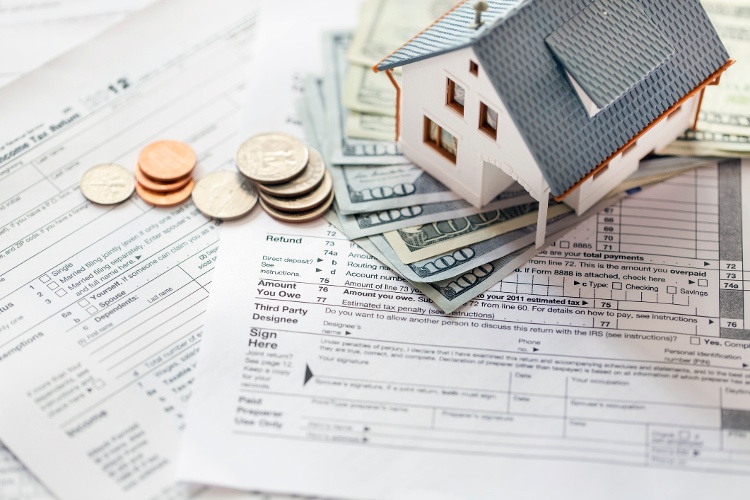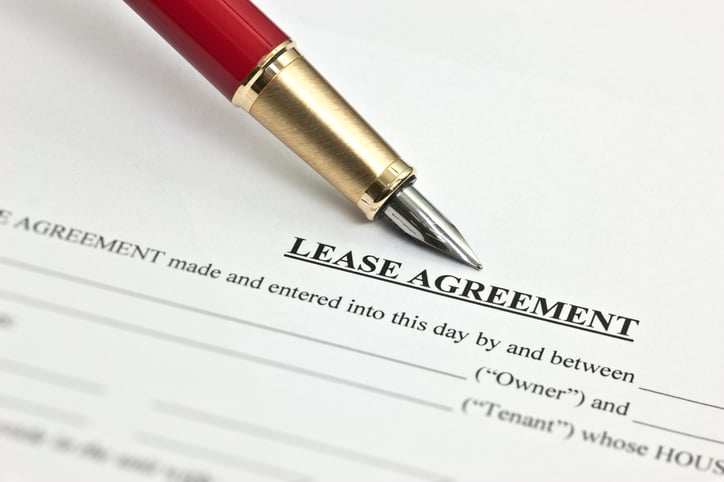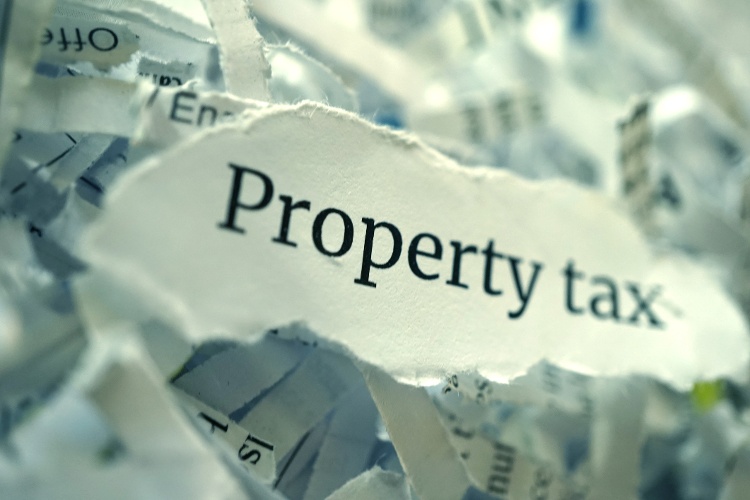Rental property deductions are expenses that real estate investors use to reduce taxable net income.
As an individual, you can’t deduct items on your tax return such as replacing light bulbs, fixing a leaky sink, or putting gas in your car to travel to and from your office. But as a real estate investor, you have flexibility to deduct out-of-pocket and travel expenses that are directly related to the upkeep of your rental property.
Tax breaks – along with the receipt of recurring income from rent payments and appreciation in property value over the long term – are one of the main reasons why people invest in real estate.
Let’s take a look at 25 of the most common deductions you can take when you own investment property.

25 Top Rental Property Tax Deductions
1. Closing Costs
There are a variety of closing costs paid when you purchase a rental property. There are three that you can deduct the year they are incurred:
- Interest
- Mortgage points
- Real estate taxes
Other closing costs – such as legal and recording fees, surveys, transfer taxes, and title insurance – must be added to the property basis and depreciated over a number of years.
2. Advertising & Marketing
Money you spend on advertising and marketing to find a new tenant is also fully tax deductible. Many rental listing websites such as Apartment List, Cozy, and Zillow Rental Manager offer free syndicated listing services. But if you pay a professional photographer or copywriter to create your ad you can deduct that expense.
3. Tenant Screening
Fees paid to screen a tenant such as a credit and background check, criminal and sex offender search, rental history, and social security number verification all costs that can be deducted. Alternatively, you can have the tenant pay for their own reports by using tenant screening services like the American Apartment Owners Association (AAOA), Avail, and MySmartMove.
4. Leasing
Commissions you pay a real estate agent to find and lease a vacant property to a new tenant are another rental property tax deduction. Although leasing commissions are always negotiable, most brokers charge a leasing fee equal to one month of rent.
5. Property Management
A good property manager will charge a fee of about 8-10% of the monthly rent collected. When you consider everything a management company does, including:
- Rent collection
- Tenant communications
- Repair and maintenance coordination
- Routine property inspections
- Compliance with local and state landlord-tenant laws and Federal Fair Housing laws
Most investors agree that the property management fee is more like an investment instead of a tax-deductible expense.
6. Repairs & Maintenance
Labor, material, and supply costs for repairing and maintaining a rental property are fully tax deductible. Think of all the things you do to keep your own home in shape, now imagine being able to expense all of those costs with a rental property. Keep in mind, however, that some major capital expenditures (CapEx) must be added to your basis and depreciated rather than expensed out the year the work is done.
7. Landscaping
Costs for keeping your property’s curb appeal in peak condition, such as cutting the lawn and trimming the trees, are deductible. The same thing is true with seasonal maintenance items, such as cleaning the gutters and snow removal once winter sets in.
8. Utilities
Normally the tenant in a single-family home pays for all of the utilities, but many multifamily properties work a little bit differently. Sometimes smaller duplexes and triplexes have a master meter for the water or gas. In cases like these, the landlord pays the utility bill and deducts the expense, while factoring in the utility expense as part of the tenant’s monthly rent.
9. Mortgage Interest
Interest paid on loans for a rental property is fully deductible. Your monthly mortgage payment normally includes principle, interest, taxes, and insurance (PITI). At the end of the year, your lender should send you a statement itemizing each deductible expense, or you can use a free rental property accounting software like Stessa to track your expenses in real time.
10. Property Taxes
In some states, property taxes are one of the biggest rental property deductions a landlord can take. For example, in states such as California and New York, property taxes on a mid-priced single-family home can easily run thousands of dollars or more per year.
11. Sales Taxes
Some jurisdictions collect a sales or use tax on the monthly rent that a tenant pays. As a landlord, you or your property manager are responsible for collecting the rental tax from the tenant and remitting it to the city or state every month. Those taxes are also deductible for a landlord.
12. Insurance
Insurance premiums are treated as a rental property business expense, including additional coverage you purchase in the form of landlord insurance when you rent out a home. Speaking of insurance, many landlords have found it to be a good idea to require the tenant to take out a renter’s insurance policy (if your state law allows) to protect the tenant and you from claims of theft or negligence if a tenant’s guest gets injured on your property.
13. Licenses & Registration
Common license fees that are tax deductible include a business license, sales and use tax license, and an annual registration fee for your LLC that you hold your rental property in. Some cities may also charge a fee to conduct an annual property inspection to ensure your rental meets local health and safety codes.
14. Attorney
Legal fees paid to an attorney for preparing or reviewing a lease, responding to a complaint, or evicting a tenant are all tax deductible. Some real estate attorneys offer fixed-fee pricing for many of their services versus a more expensive hourly rate.
15. Accountant
Fees paid to an accountant for preparing tax returns are deductible as well. To help minimize accounting fees at tax time, many rental property investors sign up for a free account with Stessa Tax Center to automatically track income and expenses, and generate tax-ready financials at the end of the year.
16. Dues & Subscriptions
Subscriptions to business and real estate publications, along with dues paid to your local real estate investment club, are fully tax deductible. There are also some very good free online resources for learning more about the real estate business, including the Roofstock Blog and Stessa Blog.
17. Continuing Education
Knowledge is power and, in a dynamic business like real estate investing, it’s important to do everything you can to stay on top of your game. Fees for continuing education like Roofstock Academy can be deducted. This training can be a great way to learn how to keep building rental income through real estate.
18. Home Office
Both local and remote real estate investors may qualify for a home office deduction. Although calculating the home office deduction used to be complicated, the IRS Simplified Option for Home Office Deduction is an easy way to figure the deduction for business use of your home.
19. Office Supplies
Office supplies used for your home office – such as stationary and printer ink – along with lease agreements and legal forms are also deductible. To create an additional paper trail, any hard copy forms and documents should also be organized and stored online with bank-grade security to help protect your data.
20. Telephone & Internet
Costs for telephone and internet used directly for your rental property business are also tax deductible. However, be careful of commingling business with personal expenses. It’s a good idea to purchase a separate cell phone or phone number exclusively for business use, and pay for the service each month using a debit or credit card linked to your business bank account.
21. Travel – Local
Even if you’re a remote real estate investor and own rental property in another state, you may still be able to deduct local travel expenses for going to your financial planner or attending a real estate networking event. Keep a log of the miles driven to and from each business appointment, then use the IRS standard mileage deduction of $0.56 per mile or calculate the actual expenses used for business purposes.
22. Travel – Long Distance
Remote real estate investors can also deduct expenses for long distance travel for things such as periodically visiting the rental property, meeting face-to-face with the property manager, or attending a local real estate convention. However, the IRS scrutinizes long distance travel expenses pretty closely, so be sure that expenses are reasonable and well documented, the purpose of travel is mainly for business, and that the majority of the travel time is spent on real estate business and not leisure.
23. Depreciation - Property
Depreciation is a non-cash expense that rental property owners use to reduce taxable net income. The IRS assumes that residential income property wears out or depreciates over a period of 27.5 years for tax purposes. For example, if your property basis (including most closing costs, capital improvements, and the home but not the land value) is $150,000 you can claim a depreciation deduction of $5,454 per year and use the depreciation expense to lower your taxable net income.
24. Depreciation – Appliances & Carpeting
Certain items such as new carpeting and appliances can be depreciated over a period of just five years, even if they last much longer. This means if you spend $5,000 to replace carpeting due to normal wear and tear, you can claim a depreciation deduction for the carpet of $1,000 for the next five years.
25. QBI Pass-Through Deduction
The Qualified Business Income (QBI) deduction allows many real estate investors to deduct 20% of the income from a rental business from the total taxable business income amount. For example, if your rental property generated a net income of $5,000 last year, you could use the QBI deduction to reduce your taxable income to $4,000. There are phase-outs and other limitations with the pass-through deduction, so be sure to ask for guidance from your tax professional.















